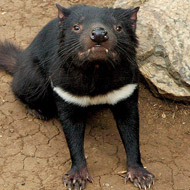
Transmissible cancers are extremely rare in nature
A team of researchers have discovered a new form of transmissible cancer in Tasmanian devils, calling into question current understanding of the processes that drive cancers to become transmissible.
Transmissable cancers are extremely rare in nature and spread between individuals through the transfer of living cancer cells.
One of the few known transmissible cancers causes facial tumours in Tasmanian devils, and is threatening the species with extinction. To date, only two other forms of transmissible cancer have been observed in nature: in dogs and in soft-shell clams.
Now, research by the University of Tasmania, Australia, and the University of Cambridge, has identified a second, genetically distinct cancer in Tasmanian devils.
Senior author of the study, Dr Ruth Pye, explains: "The second cancer causes tumours on the face that are outwardly indistinguishable from the previously-discovered cancer. So far it has been detected in eight devils in the south-east of Tasmania.
“Until now, we’ve always thought that transmissible cancers arise extremely rarely in nature, but this new discovery makes us question this belief."
She continues: "Previously, we thought that Tasmanian devils were extremely unlucky to have fallen victim to a single runaway cancer that emerged from one individual devil and spread through the devil population by biting.
"However, now that we have discovered that this has happened a second time, it makes us wonder if Tasmanian devils might be particularly vulnerable to developing this type of disease, or that transmissible cancers may not be as rare in nature as we previously thought.”
The researchers believe that it is possible there are more transmissible cancers in Tasmanian devils that have not yet been discovered.
"The potential for new transmissible cancers to emerge in this species has important implications for Tasmanian devil conservation programmes," they say.
Published in the journal Proceedings of the National Academy of Science, the research was supported by the Wellcome Trust and the Australian Research Council.
Image (C) KereshH/Wikimedia



 The Veterinary Medicines Directorate (VMD) is inviting applications from veterinary students to attend a one-week extramural studies (EMS) placement in July 2026.
The Veterinary Medicines Directorate (VMD) is inviting applications from veterinary students to attend a one-week extramural studies (EMS) placement in July 2026.